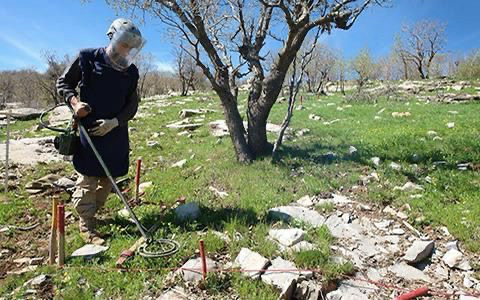The General Mine Action Directorate (GMAD) of the Kurdistan Regional Government (KRG) has announced that of the 776 square kilometers of land contaminated with mines across the region, approximately 250 square kilometers still require clearance.
Talib Khalid, spokesperson for the presidential office of the GMAD, stated, “Of the total mine-infested area, 250 square kilometers remain uncleared. Clearance teams and mine action agencies continue their operations daily in all governorates and autonomous administrations of the Kurdistan Region, systematically working to remove mines and unexploded ordnance.”
According to the announcement, Sulaymaniyah Governorate is the most heavily affected by landmines, with the Penjwen district recording the highest concentration of contaminated areas.
The GMAD emphasized its continued commitment to decontamination efforts through its directorates spread across the region. However, significant challenges persist. Khalid noted that a lack of transportation resources hampers the deployment of mine clearance teams. Additionally, the ongoing financial crisis in the Kurdistan Region and the absence of legislation protecting the rights and benefits of mine action workers are major obstacles.
Khalid also reported that while mine clearance operations are ongoing, the exact quantity of destroyed mines and unexploded ordnance has not yet been finalized, as enumeration is still in progress. The recovered munitions—gathered over recent months—are being systematically destroyed through controlled detonations.
The statement clarified that all mines and explosive remnants in the Kurdistan Region were originally planted by the former Iraqi regime, either during the Iran-Iraq War or as a strategy to suppress Kurdish uprisings and resist the Peshmerga forces.
Khalid concluded by referencing the Ottawa Convention, which mandates the complete clearance of anti-personnel mines by 2028. “Both the Kurdistan Region and Federal Iraq, as signatories to the Ottawa Convention, are obligated to eliminate all mines and explosive remnants of war by 2028,” he said. “With strategic planning and increased financial and international support, the General Mine Action Directorate may be able to accelerate this timeline.”

